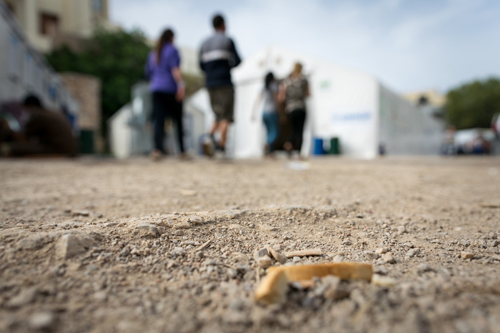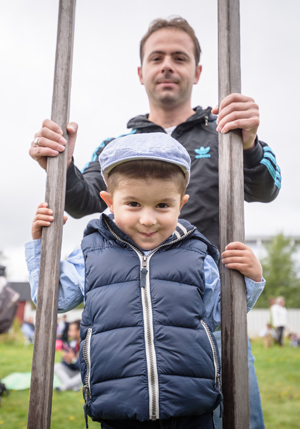ALBIN HILLERT, a communications consultant for the World Council of Churches who has seen firsthand the hardships refugees are facing in Europe, writes about why Christians should support the UN refugee agency’s #WithRefugees campaign…

It is September, 2016, and the UNHCR is running a campaign in social media for people to stand #WithRefugees, to help refugee children, like all children, get access their to right to education, to help refugee families, like all families, access their right to a safe place to live, and to ensure refugees, like any other people, can work and learn new skills to make a positive contribution to their community.
The rationale seems straightforward, and the rights listed above are not exceptional privileges awarded to refugees alone, but rely on basic human rights, as established in the United Nations Universal Declaration of Human Rights in 1948. Yet the question of if and how we are to accept and receive refugees and migrants in countries around the globe, remains controversial.

A NEW LIFE?: Taken in April, a scene in the Souda Refugee Camp in Chios, Greece, where refugees and volunteer workers reported a lack of information, long waiting times for the little food available, and poor nutrition and sanitation. PICTURE © Albin Hillert/WCC
“[H]istory tells us that migration is not a problem. Countries’ economies do not collapse under an overload of refugees. It seems migrants are simply people; they are children, parents, friends, artists, teachers, musicians, doctors. They are humans, they want to contribute, and they soon become an asset to the societies that receive them.”
The World Council of Churches has a long history of work on migration and social justice. Indeed, already from its outset questions of migration have played a central role in its work. And today, as a worldwide fellowship, churches continue to pray, work and walk together, whether in building solidarity with refugees of war, advocating for humane treatment of migrants in new countries and contexts, helping victims of human trafficking, or in recognising the right to human dignity of internally displaced persons, as well as those living in statelessness.
I am writing this text from Sweden, which is my home country, and a country that was late to give in to the rhetoric of the refugee crisis in Europe, but where politicians can now be heard talking of refugees as arriving in swarms, seeking better lives because Europe can offer high standards of living and financial security. Many even go as far as to say our European social systems have been put under extreme pressure, that reception and integration of refugees cannot keep up with the numbers of people approaching our borders, that we must take measures to protect society as we know it from collapsing.
Yet history tells us that migration is not a problem. Countries’ economies do not collapse under an overload of refugees. It seems migrants are simply people; they are children, parents, friends, artists, teachers, musicians, doctors. They are humans, they want to contribute, and they soon become an asset to the societies that receive them. As Katalina Tahaafe-Williams, WCC programme executive for mission and evangelism, recently put it in the most basic of ways, “Migration is a human impulse and a part of our humanity, not a problem to be sorted”.
I travelled for the WCC to Greece in April this year, soon after the European Union had made an official agreement with Turkey on how to manage refugees arriving at the borders of Europe, many of them journeying via Turkey to Greece and Italy. My task was to observe, write and report from the new refugee situation, as our fellow Christians in Greece had called out for support, to a people that had made every effort to help refugees, but also found itself exhausted.
The Greek islands, where refugees had arrived in great numbers in past years, and where they had engaged a whole community of local, national and international aid workers and volunteers, were again a changed place.
The EU-Turkey agreement had come as a potential relief. Only months before, the WCC had convened church leaders from 20 European countries in Munich, and together they had called for safe passage for refugees. Perhaps the EU was responding to the call – as they now proclaimed the heavy influx of people arriving at our borders would stop, that Europe would become better structured in its refugee reception, better at preserving the dignity of the people who had fled their homes.

LOOKING FORWARD: Issam, a Syrian refugee child recently arrived in Sweden. PICTURE © Albin Hillert, 2016
“At the core of our lives as Christians lies the story of a Middle East family who had to flee persecution…And yet we seem often to fail to treat refugees with dignity, as humans like ourselves.”
Reality was not the same as that vision. In Greece, we found authorities assumed a strict approach, essentially saying until we know who they are, all refugees will be gathered in closed camps, so-called hotspots, for identification and registration. In reality, these hotspots have come to act as detention centres, prisons even, putting people behind bars who have done nothing wrong but to flee their homes for safety.
And so here we are. At the core of our lives as Christians lies the story of a Middle East family who had to flee persecution. “We remember God’s great love for the world in the gift of Jesus Christ. And we read once again of the flight of his family in search of a safer place than home…“ as the WCC general secretary reflected in his Christmas message 2015. And yet we seem often to fail to treat refugees with dignity, as humans like ourselves.
There are an estimated 2.2 billion Christians worldwide, among them not only lay people and clergy, but also political leaders. Like us, many of them go to church, they pray, have their children baptised, celebrate Christmas and Easter, and believe in justice and peace for all people. If we call out as Christians, perhaps we can turn the tide and create better conditions for those without homes, those without guarantees for a safe future, those without much to hold on to but hope.
The UNHCR is running its campaign, collecting signatures from people willing to stand #WithRefugees. The WCC supports it, and for most, the basics of human dignity and human rights might be enough of a reason to do so. But as Christians, standing with refugees may not just be something we do, but an expression of who we are.
While writing this text, news reports say the European Union has now increased funding of refugee aid in Greece, to ensure refugees there will make it through the winter. It is a sign of hope, that refugees there have not been completely forgotten. But let us join the call of the WCC, the call of UNHCR, and sign the petition, so that refugees around the globe not only make it through winter, but are given the opportunity to start new lives, to find work, contribute, make friends, and live in peace.
As a Christian, I believe this is who we are.
Albin Hillert is a communications consultant for the World Council of Churches.
To sign the UNHCR’s petition – #WithRefugees – head to www.refugeespetition.org
 ALBIN HILLERT, a communications consultant for the World Council of Churches who has seen firsthand the hardships refugees are facing in Europe, writes about why Christians should support the UN refugee agency’s #WithRefugees campaign…
ALBIN HILLERT, a communications consultant for the World Council of Churches who has seen firsthand the hardships refugees are facing in Europe, writes about why Christians should support the UN refugee agency’s #WithRefugees campaign…





